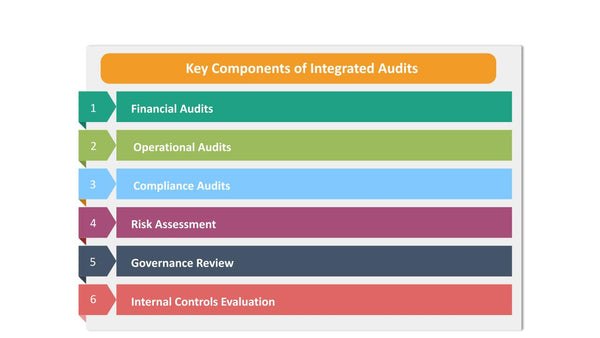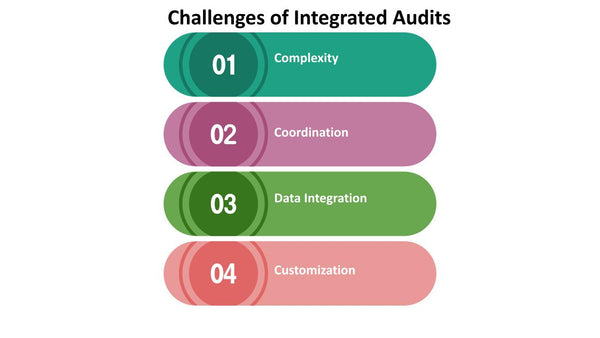Integrated Audits: Enhancing Accountability and Efficiency in Modern Business
In the ever-evolving landscape of business and corporate governance, ensuring transparency, accountability, and compliance with regulations is paramount. Integrated audits have emerged as a crucial tool in achieving these objectives. In this blog post, we will explore integrated audits, their significance in modern business, their key components, and the benefits they bring to organizations and stakeholders.
Understanding Integrated Audits
Integrated audits, often referred to as "integrated reporting," "combined assurance," or "comprehensive audits," are a comprehensive approach to evaluating an organization's governance, risk management, internal controls, and financial reporting. These audits provide a holistic assessment of an organization's operations, offering a 360-degree view of its performance, risks, and compliance.

Key Components of Integrated Audits
Integrated audits involve the evaluation of multiple aspects of an organization's operations, which can be broken down into several key components:
- Financial Audits: Financial audits are the core of integrated audits. They assess the accuracy, completeness, and fairness of an organization's financial statements, ensuring compliance with accounting standards and regulations.
- Operational Audits: Operational audits focus on the efficiency and effectiveness of an organization's operations. They examine processes, systems, and procedures to identify opportunities for improvement and risk mitigation.
- Compliance Audits: Compliance audits verify that an organization adheres to relevant laws, regulations, and industry standards. This component ensures that the organization operates within legal boundaries and follows ethical practices.
- Risk Assessment: Integrated audits involve a thorough risk assessment to identify potential threats to the organization's objectives. This includes financial, operational, and compliance risks.
- Governance Review: Governance reviews assess an organization's corporate governance structure, including the roles and responsibilities of the board of directors and executive management. They ensure that governance practices align with industry best practices.
- Internal Controls Evaluation: Evaluating internal controls is critical to integrated audits. This component examines the effectiveness of the organization's internal control systems in managing risks and safeguarding assets.
The Significance of Integrated Audits
Integrated audits have gained significance in modern business for several compelling reasons:
- Comprehensive Insight: Integrated audits provide a comprehensive view of an organization's performance, risks, and controls, allowing stakeholders to make well-informed decisions.
- Enhanced Accountability: These audits hold organizations accountable for their financial reporting, operational efficiency, and compliance with regulations, fostering transparency and trust.
- Efficiency: Integrated audits streamline the audit process by combining various assessments into a single, coordinated effort. This reduces duplication of work and minimizes disruptions to the organization.
- Risk Mitigation: By assessing risks across all areas of an organization, integrated audits help identify potential vulnerabilities and vulnerabilities, enabling proactive risk mitigation.
- Stakeholder Confidence: Investors, shareholders, customers, and regulatory authorities gain confidence in organizations that undergo integrated audits, as these audits demonstrate a commitment to robust governance and accountability.
- Regulatory Compliance: Integrated audits help organizations meet regulatory requirements, which is particularly crucial in industries with strict compliance standards, such as finance and healthcare.
Benefits of Integrated Audits
Integrated audits offer a wide range of benefits to organizations and stakeholders alike:
- Efficiency: By consolidating various audit components, integrated audits reduce the time, resources, and disruptions associated with separate audits.
- Cost Savings: Organizations can achieve cost savings by eliminating redundancies in audit processes and procedures.
- Holistic View: Integrated audits provide a holistic view of an organization's strengths and weaknesses, allowing for a more comprehensive understanding of its operations.
- Risk Management: Organizations can proactively identify and address risks across all aspects of their operations, enhancing risk management efforts.
- Transparency: Stakeholders gain a clear picture of the organization's performance, risk exposure, and compliance, fostering transparency and trust.
- Data-Driven Decisions: Integrated audits provide valuable data and insights that support data-driven decision-making at all levels of the organization.

Challenges of Integrated Audits
While integrated audits offer numerous benefits, they also present some challenges:
- Complexity: Conducting integrated audits requires expertise in multiple areas, including finance, operations, compliance, and risk management, which can be complex and resource-intensive.
- Coordination: Coordinating the efforts of various audit teams and ensuring they have access to the necessary information can be challenging.
- Data Integration: Integrating data from different sources and systems can be a technical challenge, particularly for large organizations with disparate data systems.
- Customization: Integrated audits need to be tailored to the specific needs and risks of each organization, making it essential to customize audit procedures.
Conclusion
In an era of increased scrutiny, accountability, and complexity in business operations, integrated audits provide a valuable framework for organizations to assess their governance, risk management, internal controls, and financial reporting in a holistic and efficient manner. These audits offer a comprehensive view of an organization's performance, risks, and compliance, enhancing transparency, trust, and stakeholder confidence. While they come with challenges, the benefits of integrated audits in promoting accountability and sound governance far outweigh the complexities involved. As organizations continue to navigate an evolving business landscape, integrated audits are poised to play a pivotal role in supporting informed decision-making, risk management, and sustainable growth.

